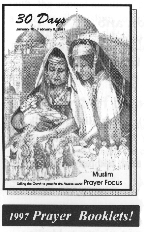A Christian Response
Ramadan is a challenge to Christians. It challenges our lack of discipline, especially in prayer and fasting. It challenges us with the fact that so few Muslims have become followers of Jesus. It is also an extremely strategic time for us as Christians to believe that God would sovereignly reveal Himself to those who do not yet know Him.
As an act of identification with the Muslim World, Christians are being encouraged to seriously pray for the 1.1 billion Muslims, most of whom have never heard the Gospel. Next Ramadan, as many as 10 million people are expected to take part in the 5th annual global month of prayer.
Throughout history there are countless testimonies of Muslims receiving dreams and visions of Jesus. Often these visions are the result of years of prayer and labour by God’s people, including martyrdom.
- The face of Jesus appeared, bringing a message of hope, in a sandstorm over war-torn Somalia on the morning of February 1st, 1992. Many recorded healings and miracles followed.
- During the early 1980’s in a village in Algeria, God revealed Himself through dreams, visions and angels in such a way that several hundred Muslims converted.
- At least 35% of all recent Turkish conversions were in response to dreams and visions of Jesus as the Son of God.
- In Albania, during Ramadan last year, the Holy Spirit came into a classroom with only Muslims and revealed God to them!
Prayer Guide
 To help you pray, a prayer guide has been written. A quarter of a million prayer guides were in use around the world during last Ramadan. This year the material is distributed in about 27 languages. A childrens' version is also available.
To help you pray, a prayer guide has been written. A quarter of a million prayer guides were in use around the world during last Ramadan. This year the material is distributed in about 27 languages. A childrens' version is also available.
Many Christians who took part in the last 30 Days Muslim Prayer Focus commented on how much they learned about Islam, and that their often fearful, simplistic views about Muslims were displaced by faith and loving concern as they read about and prayed for Muslims.
Prayer guides can be ordered directly from
30 Days Muslim Prayer Focus.
Further Reading
- Farah, Caesar E. Islam
New York. 1994 Baron's Educational Series
- Guillaume, A. Islam
London. 1956 Penguin Books
- Parrinder, Geoffrey (Ed). World Religions
New York. 1971 Hamlyn Publishing
- Weekes, Richard V. (Editor) Muslim Peoples. A World Ethnographic Survey
London. 1978. Greenwood Press.
- Johnstone, Patrick. Operation World
Seattle. 1993. YWAM Publishing.
© Copyright 1997
Bethany World Prayer Center
This article may be copied and distributed without obtaining permission
as long as it is not altered, bound, published
or used for profit purposes.
![[HOME BUTTON]](../graphics/home.jpg)
![[HOME BUTTON]](../graphics/calico.jpg)
![[LIST BUTTON]](../graphics/listico.jpg)